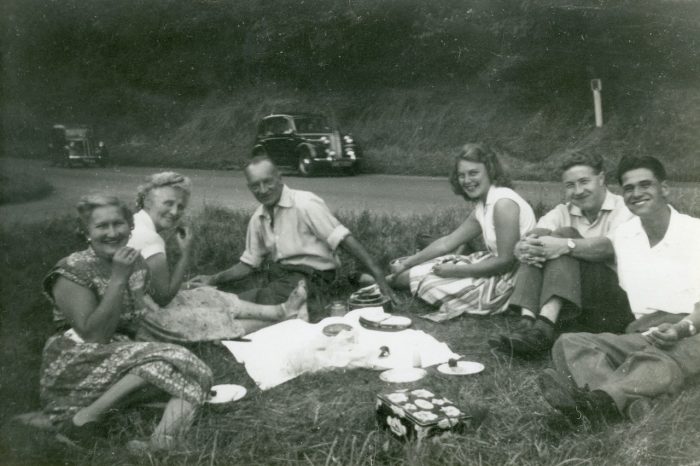When I think about the word “community,” there are some things that automatically come to mind.
For some reason, I always imagine a crockpot, which of course comes into play for any real potluck.
I picture the basement of the Ukrainian church that my family and I would go to every week when we first arrived in Canada. It smelled of meatballs and cabbage.
Community centres are an obvious connection, which house kids’ karate and printed event posters and Christmas markets and always— always—a pile of knitted things (usually potholders, which also come in handy at potlucks).
I guess the idea of community feels like a nostalgic one, something that hasn’t quite grown and flexed to fit with the current state of things. Ask almost anyone what they prioritize in their lives, and they’ll probably say work, family, security, friends, health. Few people seem to be actively seeking out community.
Community has many meanings, but we’ve broadened the definition even further online. Now, when we talk about community, we are usually talking about all the people who happen to follow an influencer or creator, as if by following the same person, they all share common values and understanding. I’m not saying this can’t be the case, because there are creators and movements that have brought together real and intentional communities. But I don’t think I need to see the word used on a fitness blogger’s website when they’re trying to sell me a 12-week program.
Online spaces are problematic for a number of reasons, even if they can foster a sense of community. Imagine if a billionaire began to charge people to use a social media platform that has always been a trusted source of news. Just as an example.
It must be something that we still crave if it’s being marketed to us all the time. But while the promise of support, acceptance, and belonging are dangled over our heads like carrots, the actual possibility of community is being hacked away, and it’s no accident.
As cities continue to build up condos and sprawl out into suburbia, third spaces are almost nowhere to be found. Cafés are now charging $9 for a latte plus tip, making them inaccessible to most people and an unsustainable option for even those who can afford it. And besides, how often are we going to cafés to meet likeminded people?
Over the last year, I began to look for community with more intention. I went to different performances and shows and meet-ups, feeling awkward at first and eventually realizing that it gets easier. Terrible as I am at soccer, I began to go to a weekly queer soccer game. I volunteered at a small press and art writing event last weekend. I’ve gone to drag and burlesque shows, trying to look friendly while everyone stood around me in tight groups that I didn’t seem to be able to access.
The good news is that they’re out there—places where I can go and meet other people who care about the things I care about. The bad news is that it’s not easy to find them, and that real community is often the exception rather than the rule. This is not a mistake. And while we are busy focusing on everything else in our lives, we are missing the importance of coming together. We’ve accepted a half-version of connection while the world’s biggest corporations understand that as long as we are kept separated, somewhat content, and online, they can pretty much do whatever they want.
I know, I sound more like an anarchist every day.
What I’m starting to understand is that community is so much more than the local Christmas market or the meat draw. It’s actually the missing piece—it’s what we are constantly reaching for even if we don’t have a word for it.
We seem to be obsessed with nostalgia, but I think what we miss most about being young is being surrounded by people. And I don’t just mean friends, or the people you choose. There has always been something meaningful about being with people you may not agree with or have much in common with on the surface. We’re supposed to be talking to people who are different from us: younger, older, further left or right on the political spectrum, radical as well as traditional.
It’s the same thing that sitcoms have offered us: an all-encompassing sense of belonging. Whether you’re in a good or bad mood, an introvert or extrovert, sitcoms like The Office and Friends and Big Bang Theory tell the story that everyone has a place. And we watch these shows on repeat. It’s close to friendship, but it’s not quite that.
Lacking that consistent flow of connection, I’ve chased after countless other things. I’ve been convinced life would be complete with the perfect job or partner. I’ve been putting all my eggs in one basket, my little individual basket, and wondering why it’s never quite been right. Jobs, partners, raising children, hobbies, close friendships, making a bunch of money—it all cracks under the weight of what we hope it will do for us. We’ve been told individual success is the key. We’ve been told we don’t need each other.
It’s no coincidence that people are more isolated than ever. Cutting people off is no longer seen as extreme, and that’s because our interpersonal relationships can’t handle the strain of expectation we’ve put on them. Because we are connecting with so few people and with such intensity, friendships burn out. Romantic relationships implode. Jobs fail to satisfy what we want and so we move around. We only have time for what serves us, and we’re told that this mindset is self-protective and necessary in today’s world. We’ve learned to be afraid of one another, and it’s a tragedy.
Unlike bell hooks, I do believe there are times when we have to walk away from relationships. But what if the default was not to do that? What if it was to have the conflict, be angry at someone, and then show up the next day anyway? What if a disagreement was an opportunity rather than a loss? This is what community can offer.
Maybe we don’t see the effort as being worth it, especially if community feels like something from a previous generation, or an entirely different era—one in which people lived in proximity because they had to.
Individualism feels like the way forward; we are no longer sharing meals around a fire, looking over our shoulders for coyotes. But what if we lost something more than we realized in growing up and moving on? What if it was never really about sharing food or staying vigilant against predators but another thing that was essential to our survival?
Of course, it’s not too late for community. But we’re going to have to fight for it, one potluck at a time.
~
Please consider Boosting our authors’ articles in their first week to help them win Elephant’s Ecosystem so they can get paid and write more.












Read 7 comments and reply